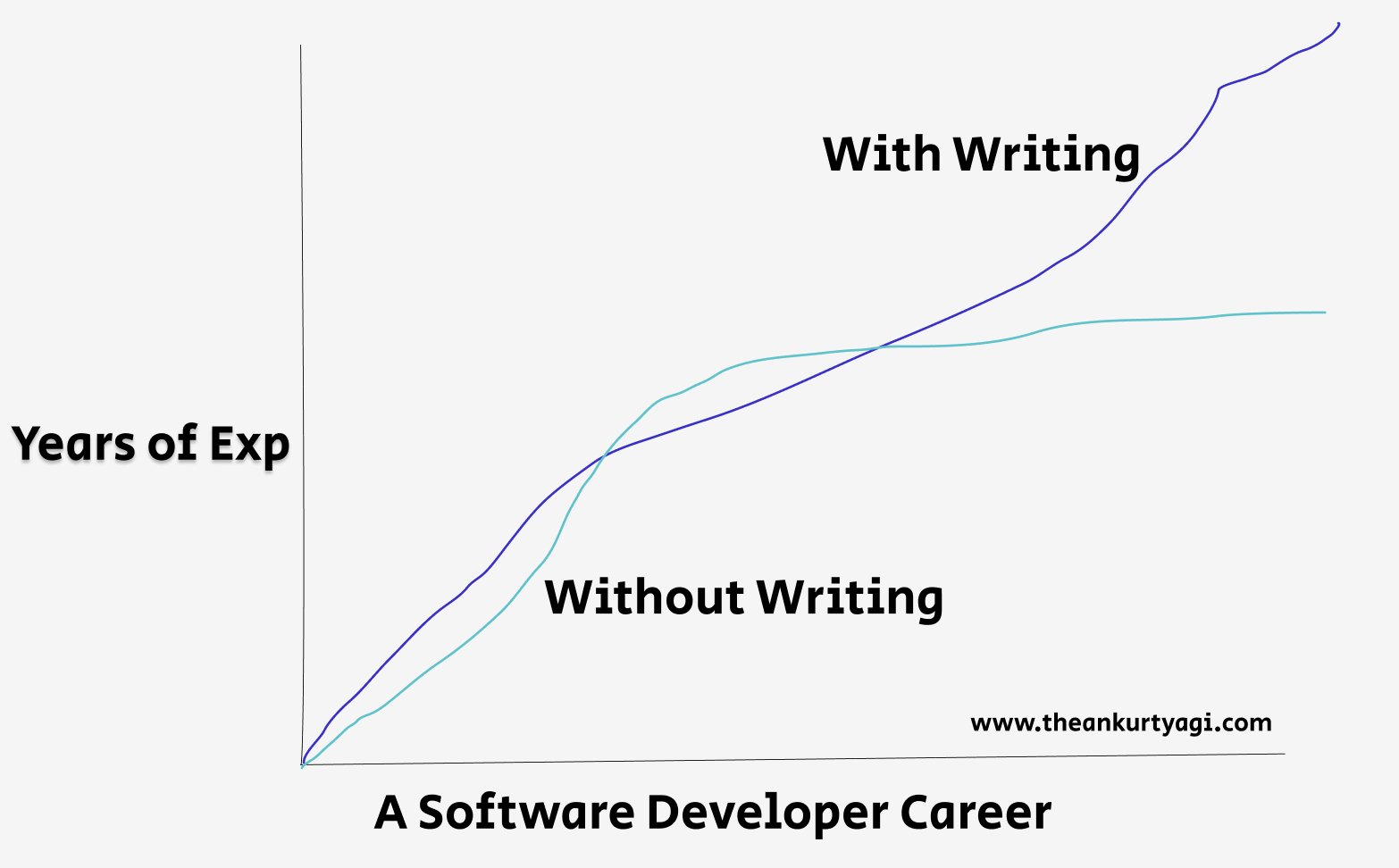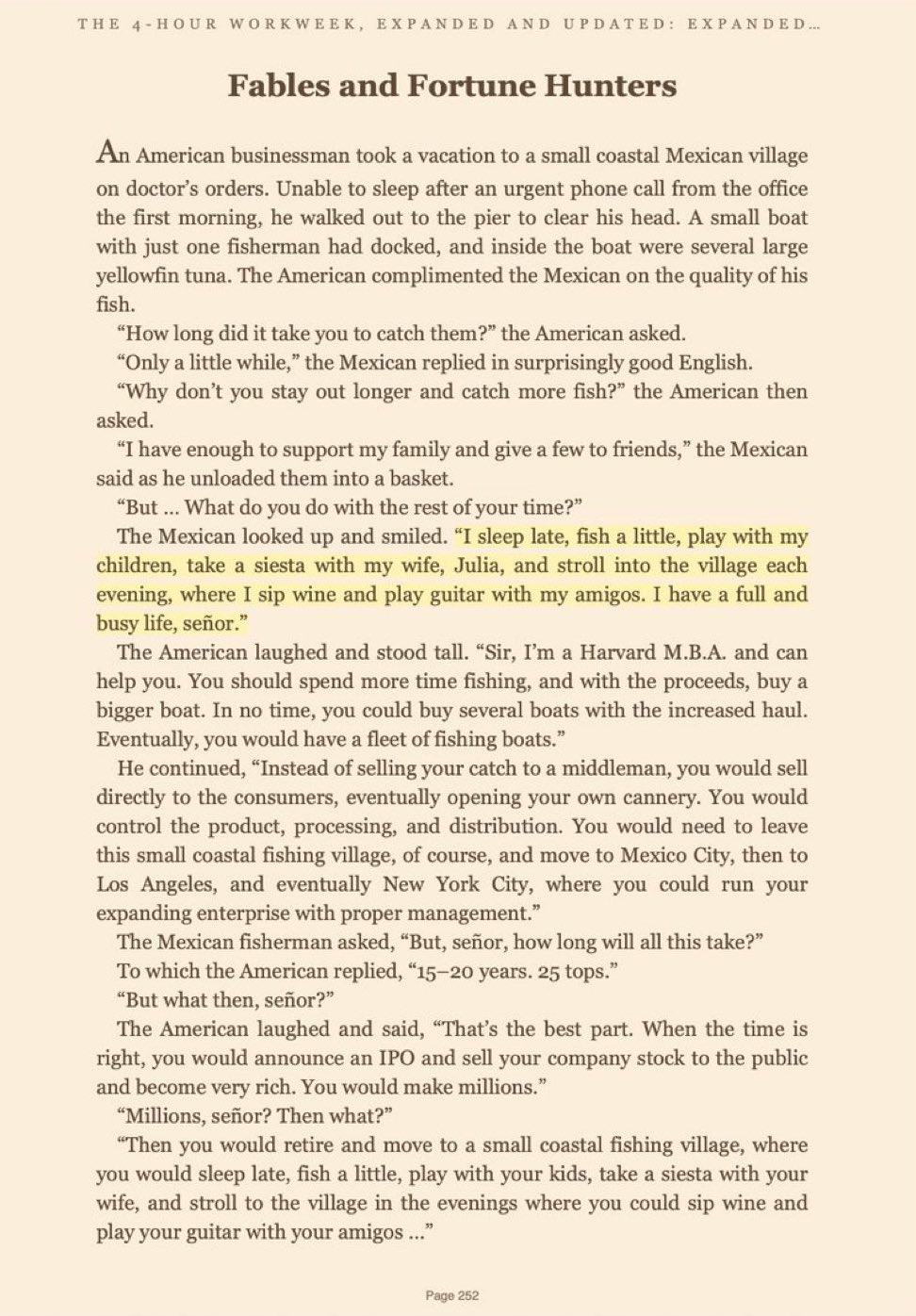How I Become a Better Writer as a Software Engineer
Software engineering is not just about only code. It’s about people + code!
Writing is an important skill for software developers. Indeed, poor writing can hamper your career advancement after a certain level.
Too many engineers get it late in the game that “Soft skills pay hard money, not just code.” This is where a developer who is average in code but very good in communicating and writing makes it to a higher level much easier than the coding nerd.
Software engineering is not just about only code, it’s about people + code!
Writing is the second best thing you can do after coding to improve your chances of success in software engineering. If you want to advance, you should work on your writing and communication skills.
Managing the expectations of your boss and team is a difficult task for people.
Your career growth is determined by how well you communicate your goals & manage expectations to the best of your ability, and writing makes you stand out.
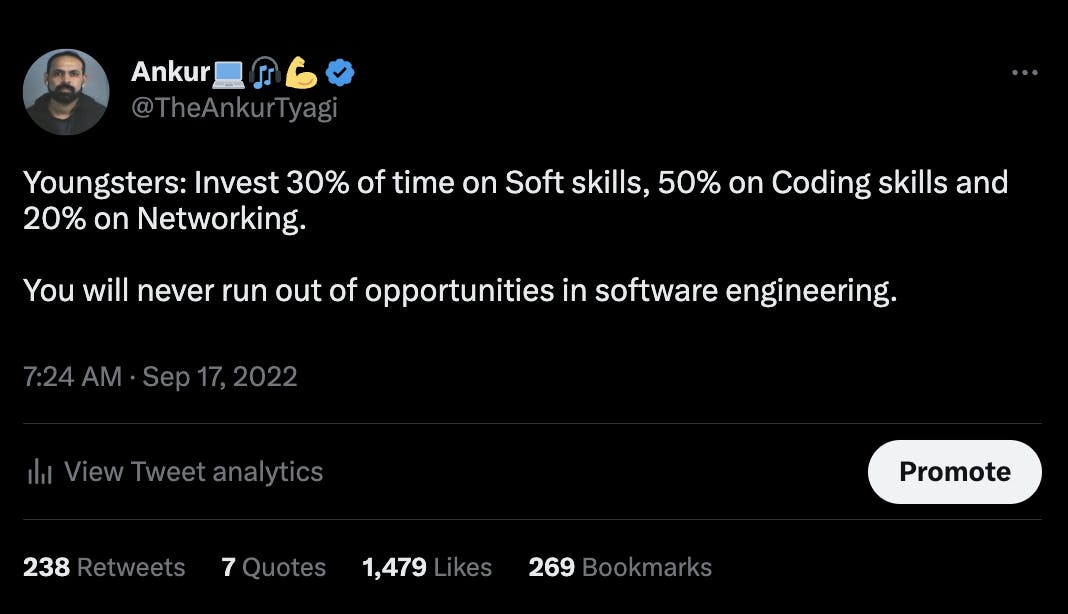
This article was originally published on my website here.
TL;DR
How to become good at writing.
Why writing is important.
How I motivate myself to write.
How writing can help you advance your career.
How to get feedback on your writing.
How to Become Good in Writing
I would say there is no perfect strategy to become a standout writer being a software engineer.
“Don’t look for a strategy; look for your unique voice and style.”
Read 4-5 unique articles per week.
Write one blog every week.
Why You Must Read Fellow Software Engineer's Blogs
Read talented engineers' blogs to understand how they write.
How they present ideas in a blog post, email, presentation, and RFPs and expose themself to various writing styles.
I read many blog posts by Gergely Orosz, Aman, Catalin, Angie Jones, Tapas, and other well-known software engineering writers.
Most of them have a unique style. When I first started writing, this got me thinking about my writing style and helped me shape it.
Your writing style and what you're writing is essential. However, it must be distinctive to the reader.

Why is Writing Important?
You must be an excellent writer to become a great software developer.
Clearly articulating your ideas within the team and online is a superpower because most developers struggle to do it well.
Consider how much writing you do daily that does not involve writing code.
Chats, emails, docs, confluence drafts, readme files, code comments, git commit messages, pull requests, code reviews comments, and so on...
Writing is an important skill for developers. Indeed, poor writing can hamper your career advancement after a certain level. "Too many engineers realize late in their careers that "soft skills matter equally, just like code."
A typical software engineer's writing includes the following
Lots of Slack/Teams chat messages.
Emails.
Commit summaries.
Code review comments.
Confluence documents.
Requirement Traceability Metric (RTMs), Jira Tickets, Scrum Stories, Sprint Planning docs, Daily Scrum, Retrospective docs.
War room discussion and Production bugs RCAs.
Performance reviews: peer reviews, self-reviews, and Annual reviews by EMs
I wrote about writing more in this article A Software Developer’s Guide To Writing.
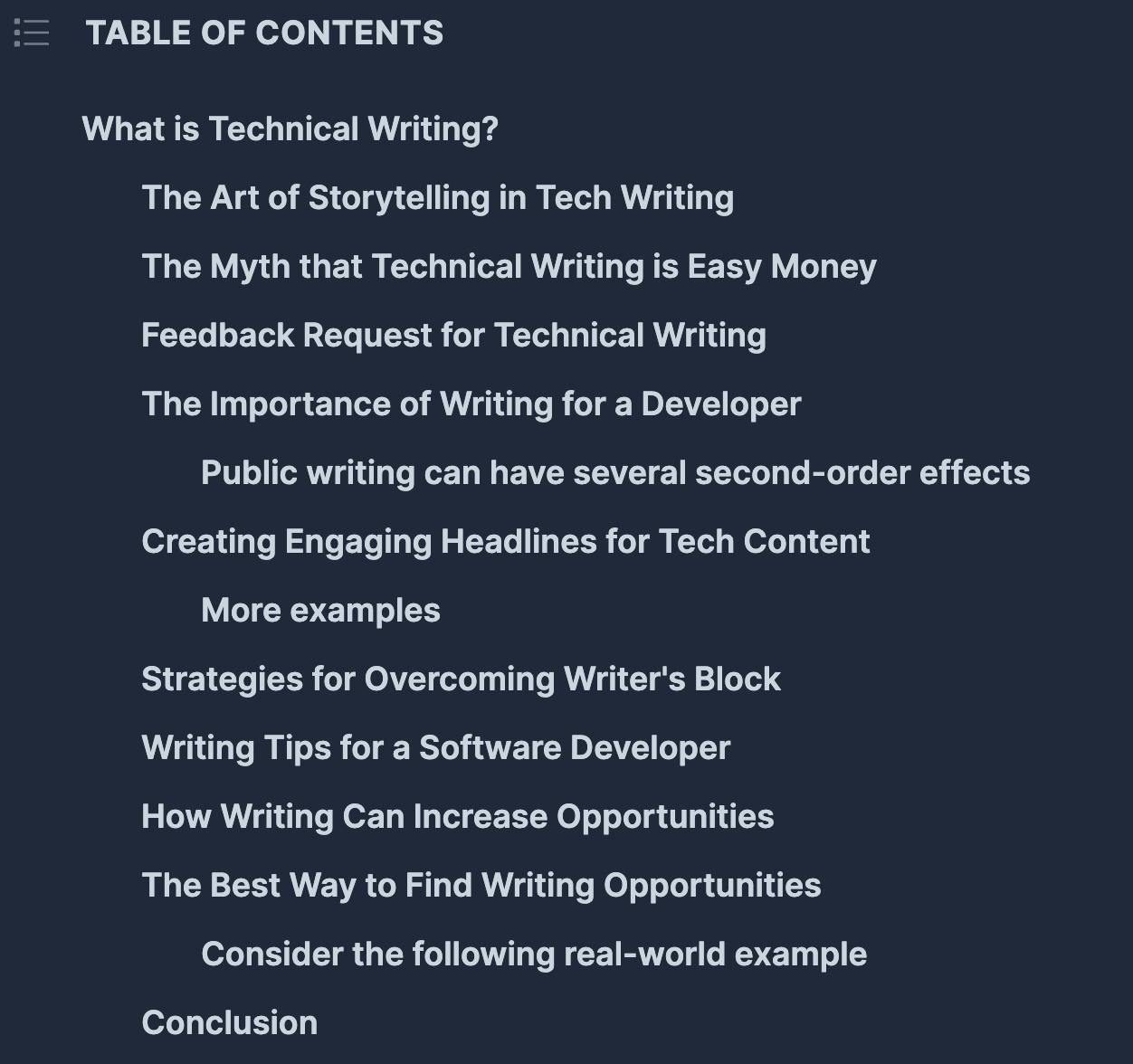
How I Motivate Myself to Write
There simply are no shortcuts to becoming better at writing.
The more and more you write, the better you will become at it, but you have to put in the work.
There are no shortcuts.
A Back Story from My Career
When I joined Barclays in India, my manager asked me to review the documentation. He also assigned a buddy programmer to help me figure out what was going on, how we operated, and our priorities that year.
As a senior software engineer and team lead, I worked on big projects earlier, but here the process was completely different and new to my expectations, they heavily relied on docs for the onboarding as most of the people don't know the whole e2e ecosystem and I realize this after a year. They were true as the business has very complex rules and regulations. It was impossible for a developer to just remember everything all the time.
That was the turning point for me and my career as I have taken writing very seriously and I see many gaps in the docs so I pitch the idea to my manager to improve the onboarding flow and many other business flows where technical details were either missing or redundant as per the latest development.
It's a win-win for both me and my manager as I get to improve my writing along with my business domain knowledge.
How do you become motivated and inspired to write? A lot of people ask me this question, especially now that I regularly blog and am able to earn a respectable side income.
Here are the 5 strategies and actions that I found to be effective, some of which may prove helpful if you want to write more frequently.
1- Start Writing - Regularly But?
In 2017, I decided to write about my experiences in software engineering, a field in which I had previously worked for many years.
When people ask me for blogging advice, I always give them more of the same: pick a schedule you can live with and stick to it. Write when motivation strikes. I personally tried all the schedules, morning, evening, afternoon, and late nights but it’s hard, very, very hard to write every single day, so next time someone tells you they were writing for X years. Most likely they’re meaning they were writing whenever motivation strikes most of the time; otherwise, they’re selling you something 😉
Treat each blog post as a small bet and make a commitment, time! You'll discover a lot.
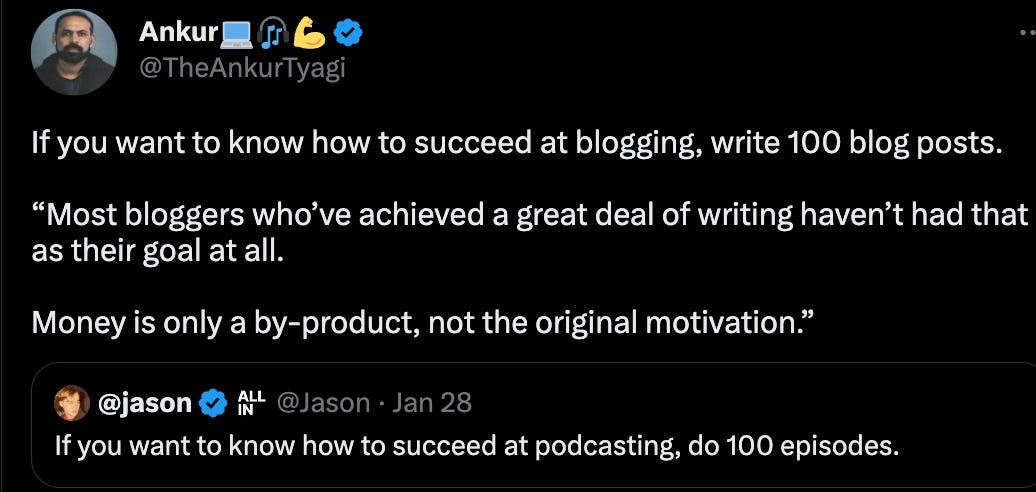
2- Copy Your Favorite Blogger's Writing Style
Most of the writers I like on the internet have a very unique style.
This made me consider my writing style when I first began.
What format should I use when writing? I experimented a lot and am still not afraid…to try a new style… but when I first started out, I tried to emulate the writing style and approach of well-known bloggers.
Nowadays, I see many new writers copying my style… 👍
You'll develop your writing style as you write more, and you won't feel the need to "copy" another writer's style. In my case, this is what took place.
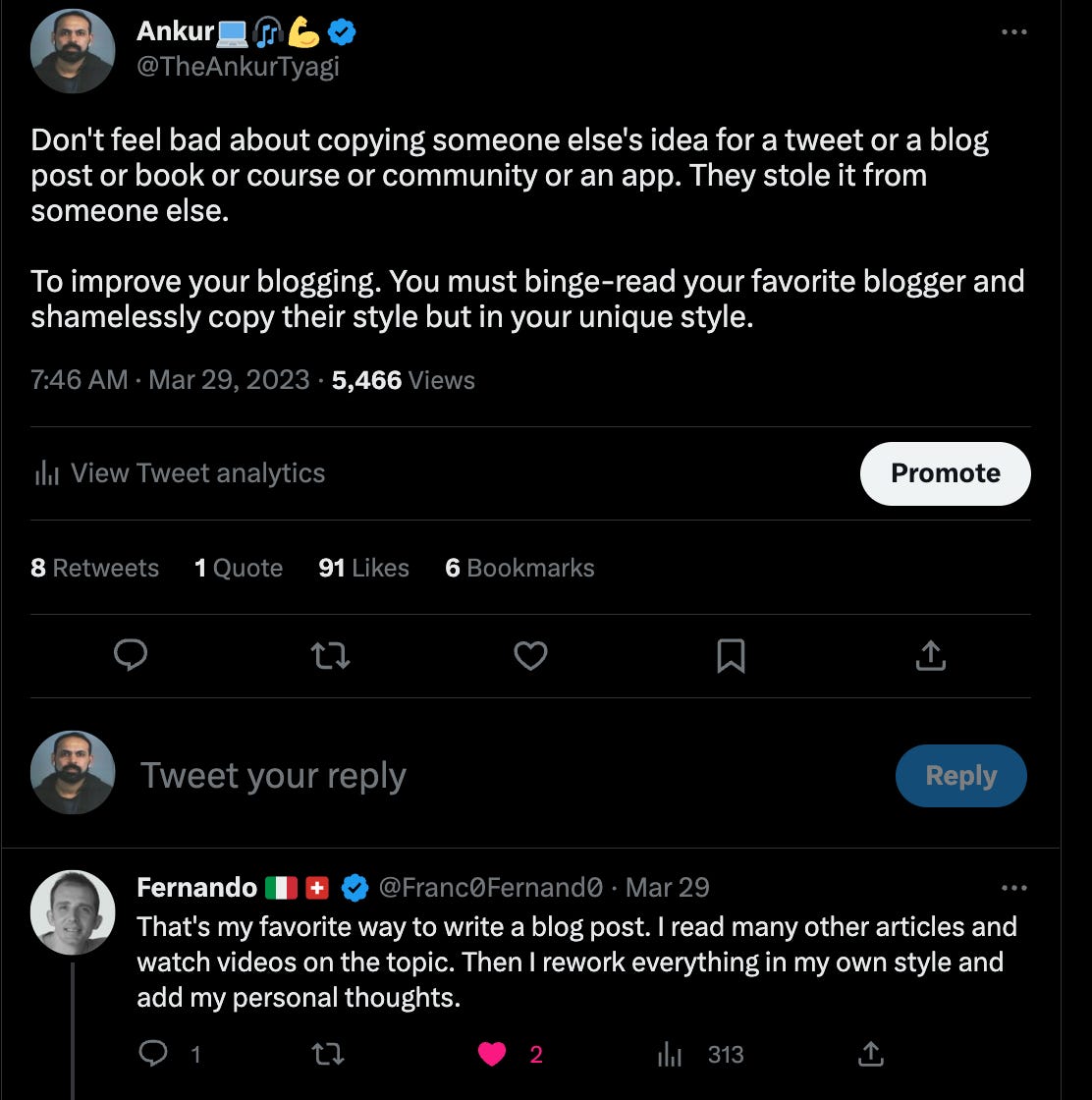
3- Capture Ideas On The Fly
Taking notes as ideas came to me has been extremely beneficial to my writing.
You don't need another app. The Notes app is the best idea logger you have on your phone. Anytime I get a new idea, it goes into my log as a new task.
Ideas for my tech blogs
Ideas for my tweets
Ideas for my small bets
Ideas for my business
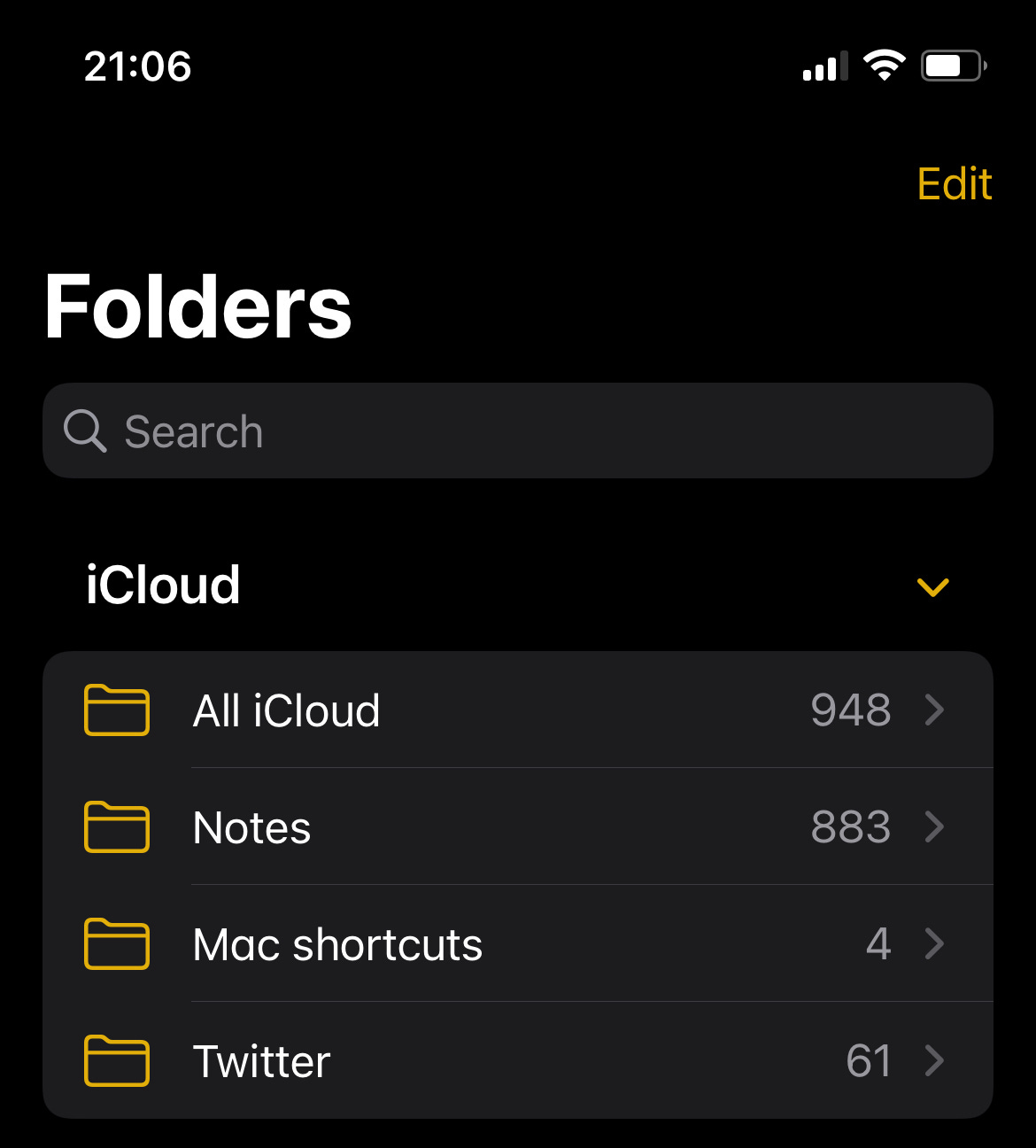
4- Start with Cross Posting but Own Your Blog
The initial years of blogging/writing are very boring. Despite very good writing, a blog would grow only slowly. Big views would seem to be a distant dream. The effect of SEO kicks off only after a certain amount of time, and then it picks up momentum. Patience and persistence is the key.
Start small and keep it simple; consider blogging as a small bet and only write when inspiration strikes. Try publishing at least one post every month and after a year, assess whether you still want to continue; otherwise, blogging is not for you!
Instead of writing for a big audience, write your blog for one specific person.
Write when the motivation strikes you.
Editing your thoughts is more important.
Don't write under pressure to write a blog post.
I shared my thought on a hashnode boot camp at the start of this month. If you have time watch here: Hashnode Bootcamp Day 1: Boost Your Developer Career through Writing | Ankur Tyagi
5- Your Draft is as Important as Your Live Blog Post
I have a lot of ideas and write whenever inspiration strikes because it allows me to deliver the best content rather than forced content.
My approach is this:
I write out key ideas I want to explore as bullets.
I write out each of those bullet ideas by adding a few paragraphs to each point.
I often do research during the draft stage, reading up on topics I'm writing about and then quoting or linking to relevant resources.
I kept my Twitter timeline open and searched for old tweets to link to.
I use Canva to create a simple blog banner just before posting.
My draft was complete when I wrote about all the parts I wanted to.
How Writing Can Help You Advance Your Career
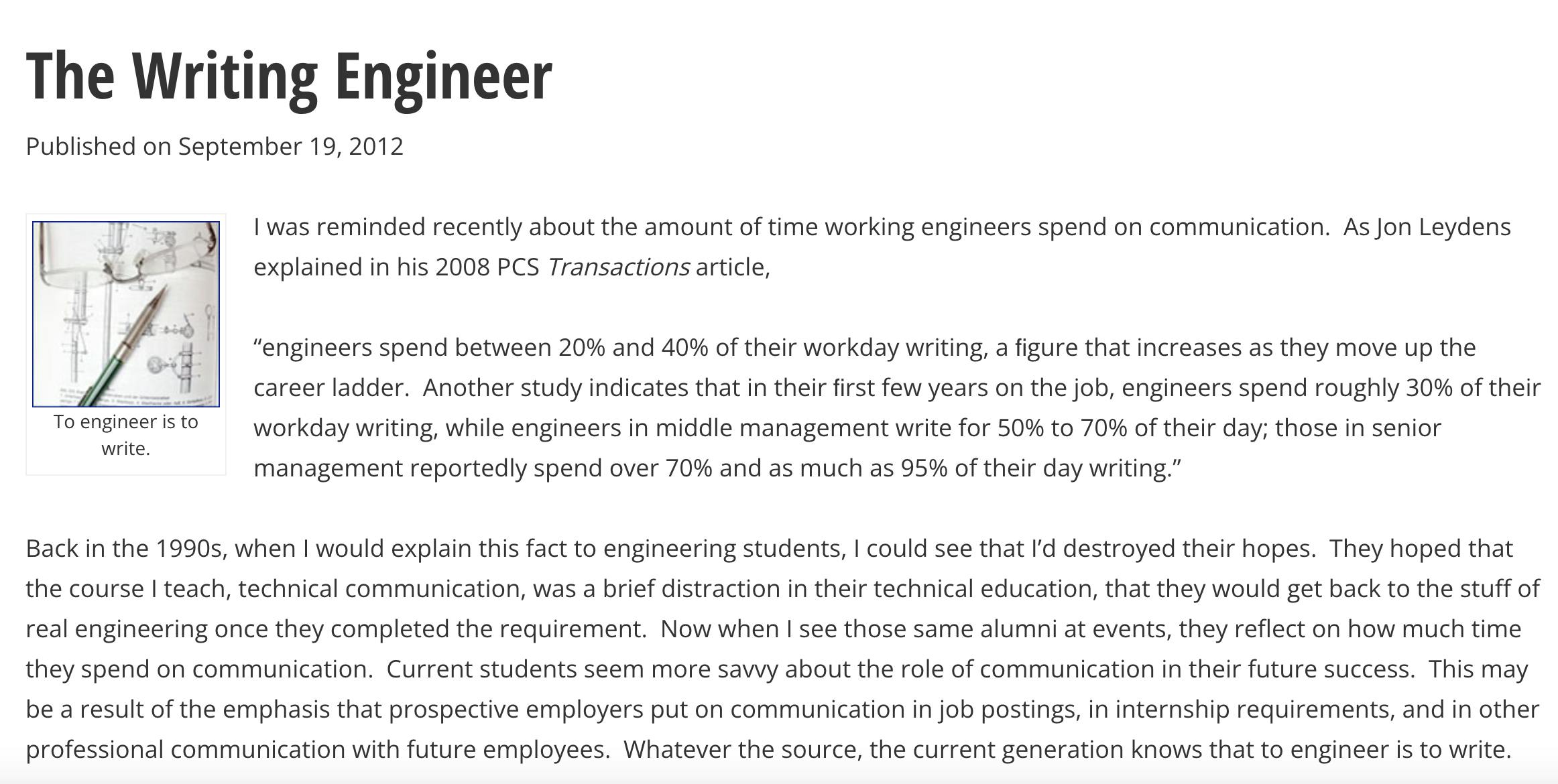
– Jon Leydens, as cited in The Writing Engineer
Software engineering is a team game. Writing is an incredible tool for expanding our knowledge in a specific tech domain. Writing gives you the chance to conduct in-depth research on a specific technology, tool, or concept. You can share what you learn with others in a clear and concise way by writing about it. You won’t have to rely on social media platforms all the time (Twitter, Reddit, LinkedIn, etc.) to get the word out.
An example would be the more than 10000+ views on my blog "How I Made $30,000 From Writing in 1 Year" on Medium. Having a blog plays a big part in having an online presence.
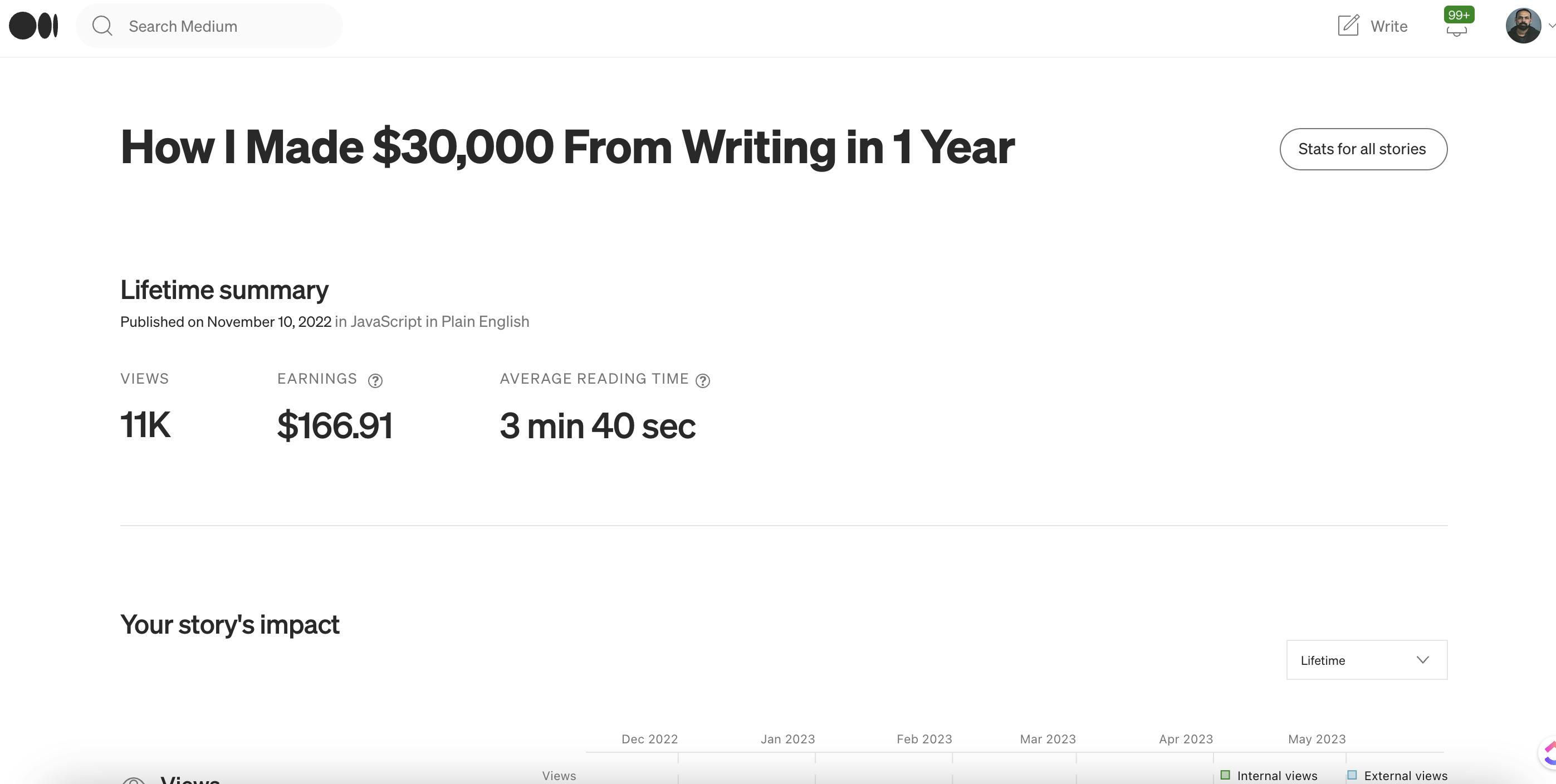
Your ultimate goal isn't to develop a daily writing habit. It's falling in love with interesting ideas, side projects, tech tools, and frameworks to the point where you can't stop telling everyone about them.
Second Order Effects of Writing
Writing is the most effective way to promote your ideas on the internet. It’s the best business card on the internet that works for you round the clock.
Why A Developer Should Write
Startups always looking for good communicators.
Writing builds your credibility in tech.
You become a good teacher.
Writing opens doors to new opportunities.
Writing encourages you to consume good content.
You can earn a good passive income.
My favourite lines from — @david_perell
The market doesn't see your ability, it sees your ability to communicate. "The world rewards the people who are best at communicating ideas, not the people with the best ideas.
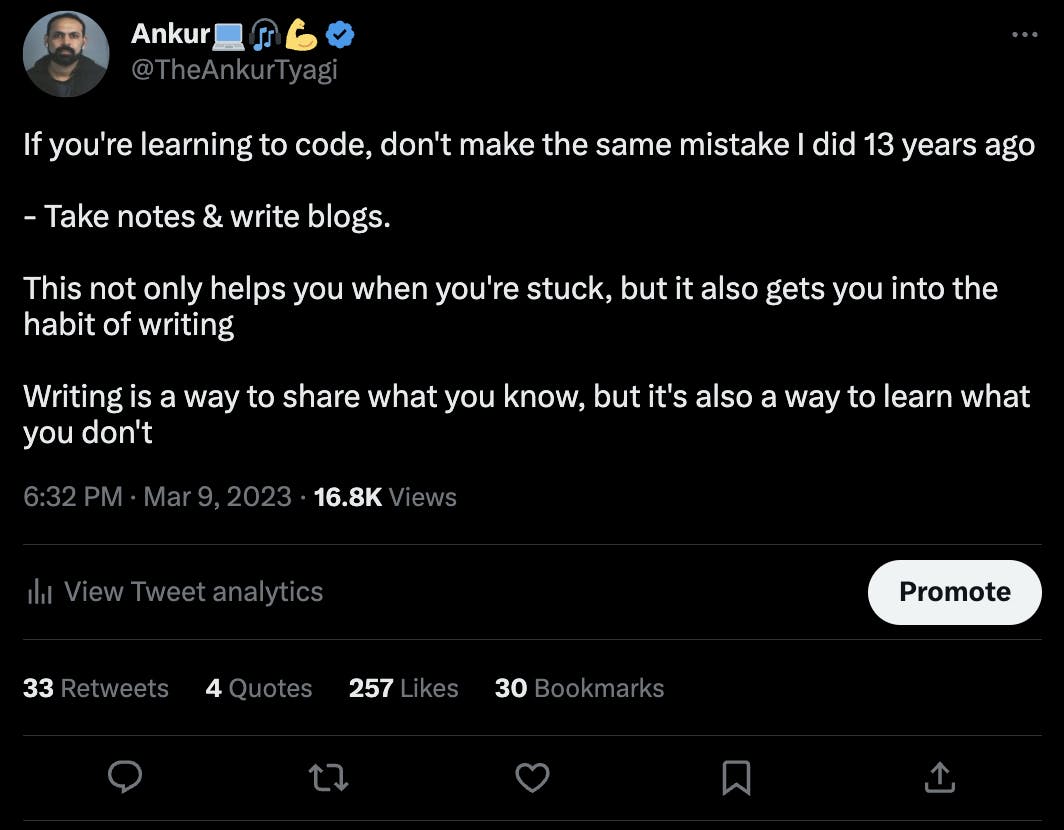
Write to Explore
Writing is used to clarify thinking, explore ideas, ask questions, reflect on learning, and look for connections between theory and practice. Writing to encourage active thinking and learning. Every software developer must know how to leverage "Writing as a Learning Tool."

Writing Helps You Find Jobs and Clients
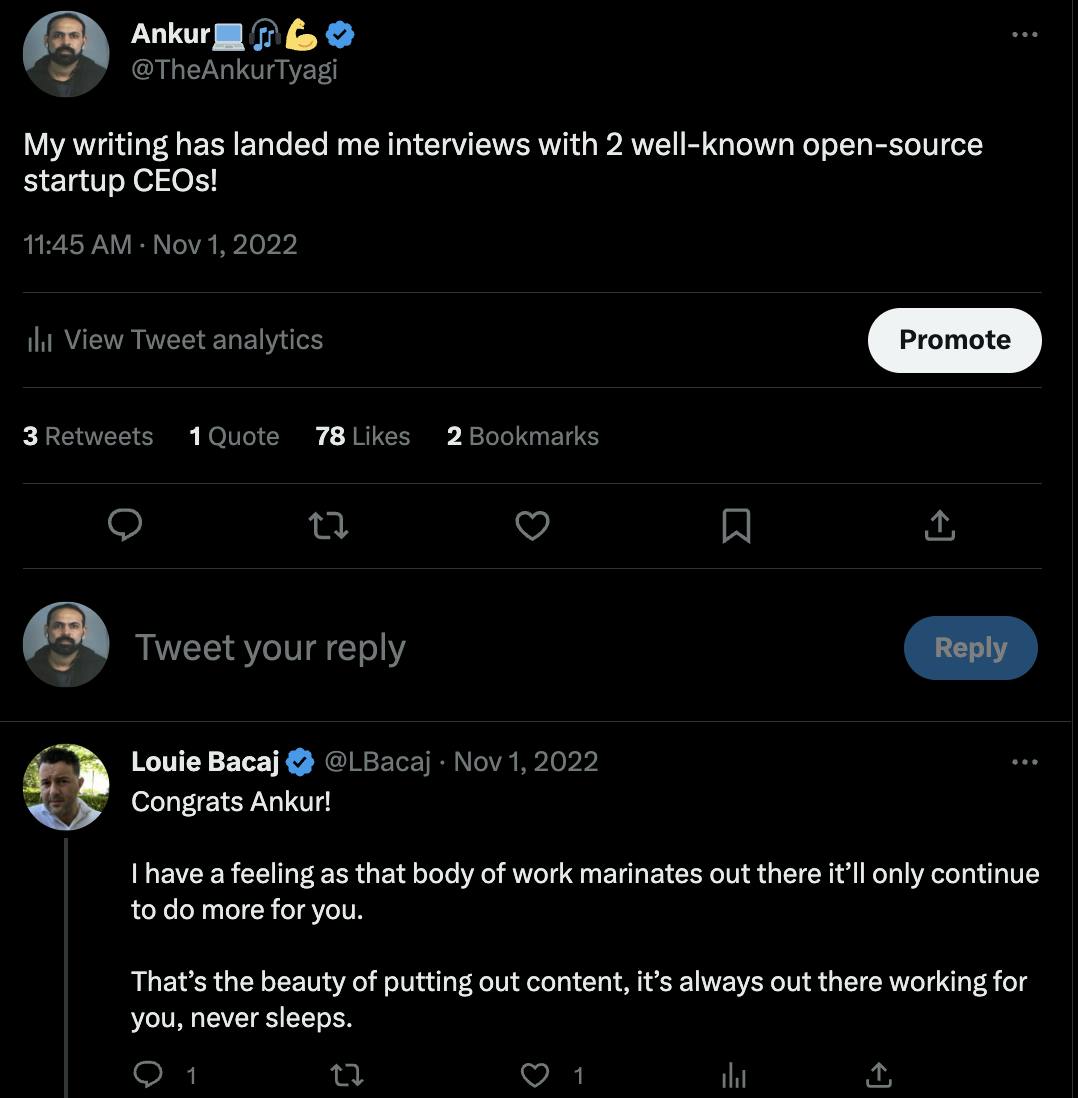

How to Get Feedback on Your Writing
My fundamental principle of asking or giving feedback.
Feedback isn't about what you like or dislike; Feedback is about what works or doesn't.
Even the most perfectly written paragraph must be cut if it needs to be clarified in the blog post.
The most frustrating feedback I’ve received on my writing was, “It’s a great post.”
Feedback like the one below is entirely useless.
"I didn't like it,"
"That was great," or
"I love your writing."
So to avoid such situations, you must put in initial efforts and make their life easy; again, it’s you who needs a favour.
They don’t have any obligations to give you good constructive feedback despite the fact that you both have strong professional relationships, as everyone prioritizes their life. Next time when you send an email, chat, raise a PR, give code review comments discuss with your peer/manager or your internet friends and ask them...
For e.g: Hi, we're working together on this code but today I have a different question.
Do you mind sharing your genuine feedback on my writing?
Share your blog posts with your friends and connections and ask them to give feedback in terms of the ABCD framework.
What was "Awesome"?
What was "Boring"?
What was "Confusing"?
What "Didn’t" you like at all?
More examples are in this guide, "A Software Developer’s Guide To Writing."
A Strategy I used to get Feedback in my Twitter DMs
I sent my drafts to established writers or developer advocates in IT.
Take a look at examples from last year when I wrote about my experiences as a developer advocate.
Example 1:
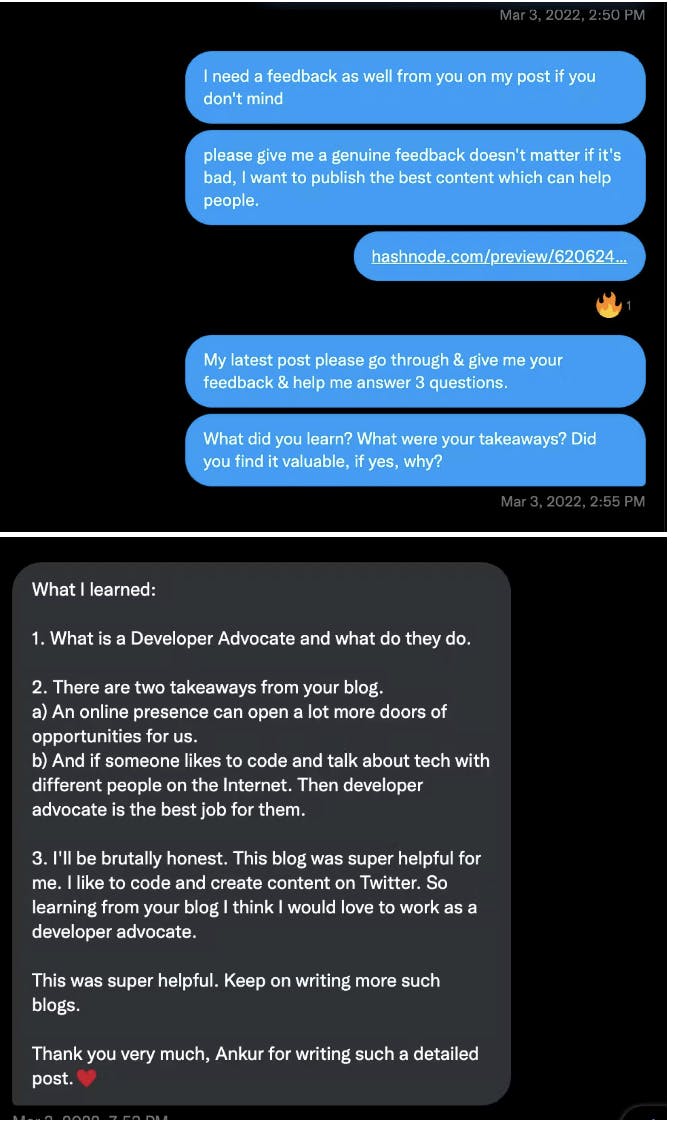
Example 2:
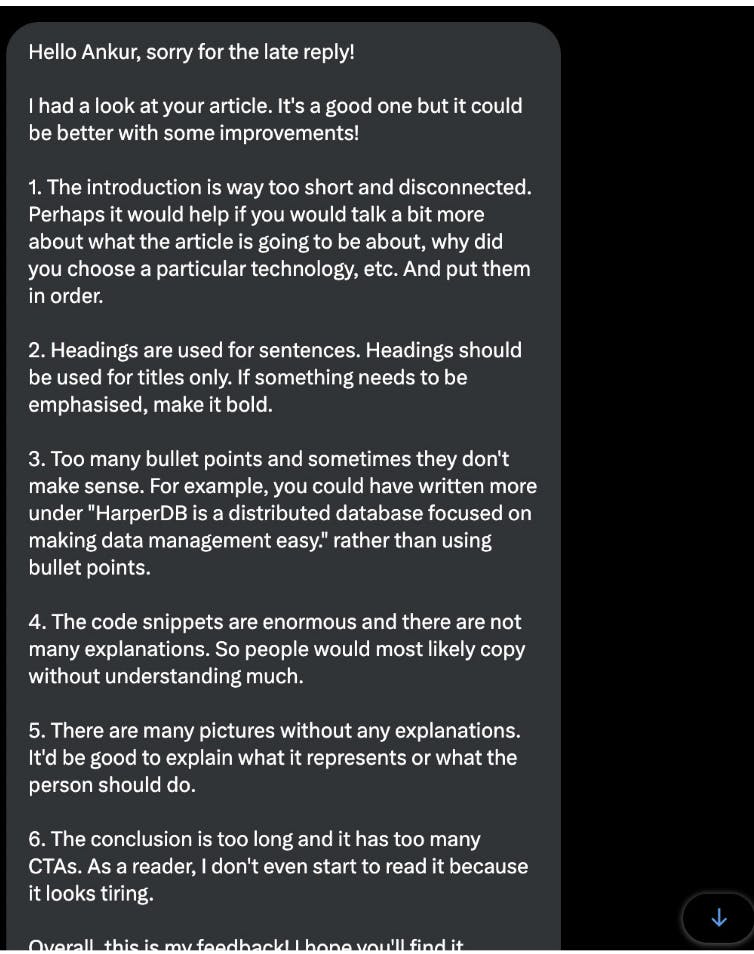
You can read the above blog post “How To Use HarperDB Custom Functions With Your React App.”
Two-way profit from asking for feedback on your writing.
You’re getting feedback on your post.
You’re learning how to give constructive feedback.
You must notify the most crucial rule in the above two examples, i.e.,
“criticism should be constructive.”
Surround yourself with action-oriented bloggers!
This Feedback Loop has Taught me the Following
You always share a blog post in Google Docs or notion to make it easy to get feedback.
You shouldn’t be afraid to send cold DMs (Again, proof that cold DM works).
You must act on the feedback and do a follow-up and give proper credit due.
At last, you don’t need to find your mentors. You need to dare to reach them and wait for their reply.
Being a good critic is challenging, so become the same for someone and help other writers.
At last, always be kind. Reading and responding to your work requires time and effort.
Always say Thank you to people who take the time to read this and give you feedback.
Work hard, be kind, & amazing things will happen...
- Conan O'Brien
A professional relationship is strong when both people maintain mutual respect.
Finally, a professional relationship is far too complicated to be classified as black or white, small or large, fair or unfair. Every connection is unique and special.
When sending out messages, personalise them.
**
Writing feedback or questions in a blog's comments section is far more effective than standard replies like “Good work“, or “Keep up the great work“ Instead, say something more constructive for e.g: “I like the way you build this integration with React” or ask a question “How did you choose this blog post idea and why React not XYZ framework“ they’ll give you much better and personalised reply.**
The Last and The Best Example
This is how we should all provide feedback if we admire someone's work.
This validates my decision to write the book.
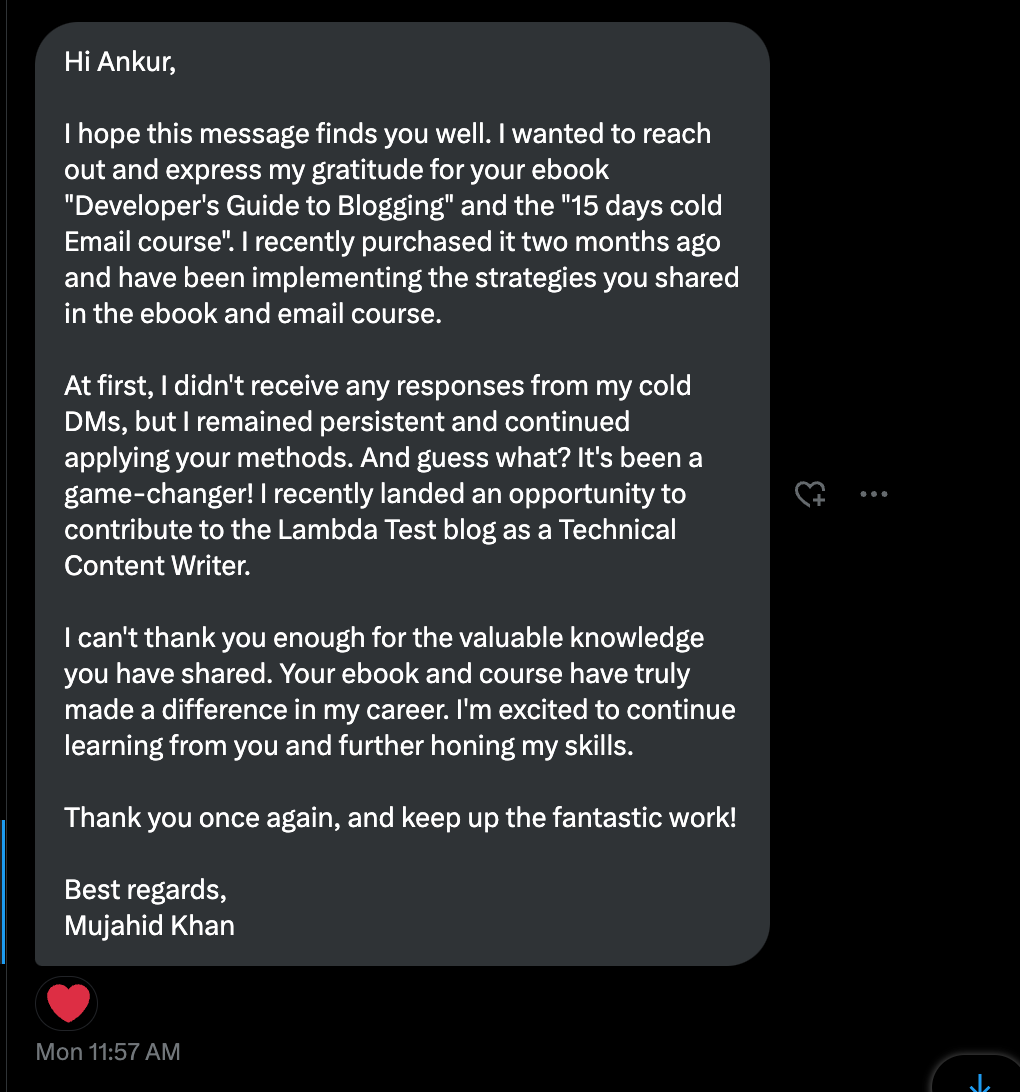
Start reading my book, A Developer's Guide to Blogging, whenever you're ready.
Transform your blogging into a lead generation machine with “Developer's Guide to Blogging”. This comprehensive book will teach you the system I use to grow my blogging views from 0 to 900K+ on multiple platforms and $100,000+ in side income from my writing.
Conclusion
Writing well is a valuable asset for a software engineer in tech.
Instead of paying attention, people and businesses give it to you. When you write a blog post, email, code comment, review etc... you get immediate feedback, and your writing helps you get more opportunities and helps you in building your soft skills.
Investing in writing every month throughout your career is a simple and effective way to grow your career in software engineering.
If you plan to launch a blog in 2023. Instead of writing for a big audience, write your blog for one specific person.
Write what you know/currently learning.
Writing displays you have soft skills AND technical knowledge.
Writing builds your personality and networking.
A blog makes you more visible to other people, founders, and startup CEOs looking for someone to do the stuff you are talking about.
My blog opened a lot of doors for me not just paid writing gigs but getting a job offer, an invitation for a podcast, meet-ups etc.
If you're thinking of starting a blog in 2023. Instead of writing for a big audience, write your blog for one specific person.
Here is my “blogging handbook”: A Complete Step-by-Step Guide to Start a Blog."
At last, Whatever you do, always keep this story in mind.
That's all for now; I hope you enjoyed this blog.
If you enjoyed the article, you’d love my newsletter.
Sign up here: 2-1-1 Career Development Newsletter
For more actionable career advice, follow me on Twitter.

